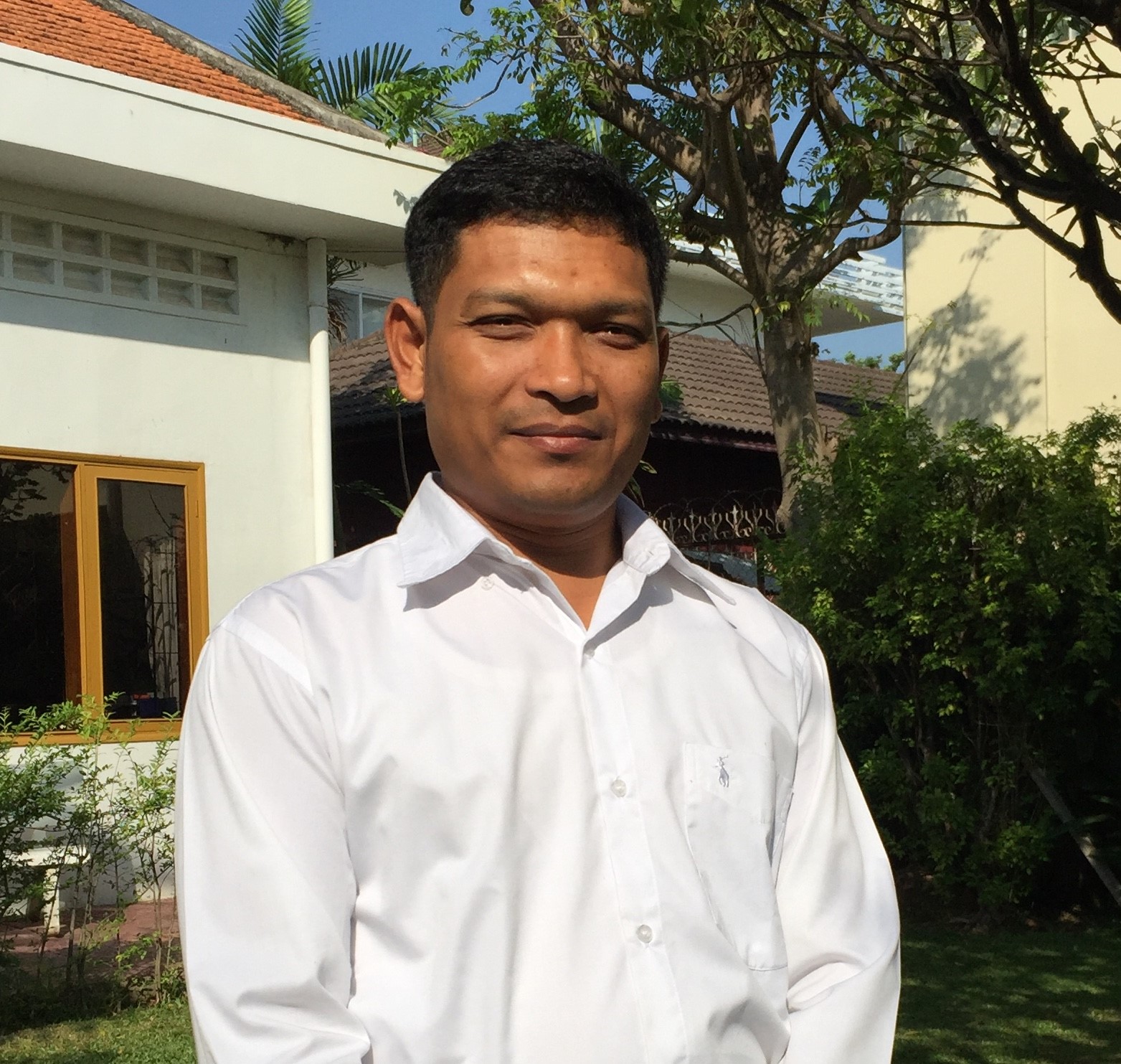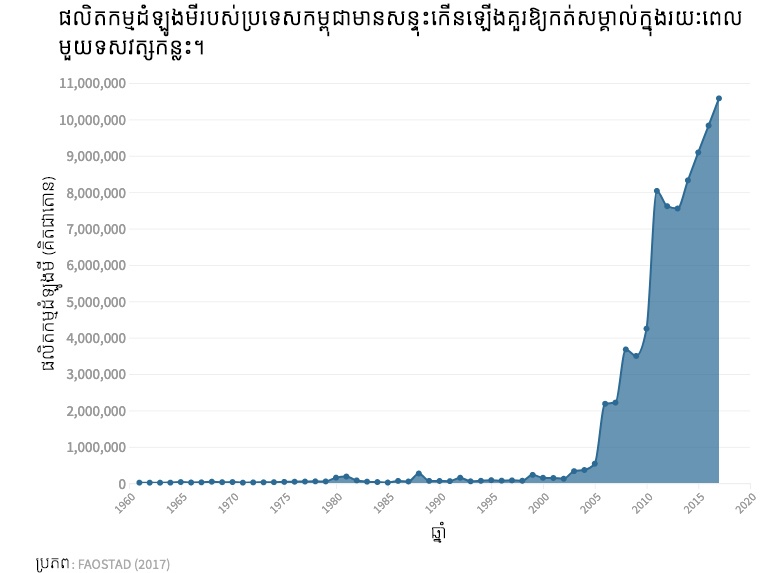ករណីជោគជ័យនៃកម្មវិធីបណ្តុះបណ្តាលស្តីពីអក្ខរកម្មទិន្នន័យ៖ លោក រឿន ណារិទ្ធ
 សិក្ខាកាមចូលរួមវគ្គបណ្តុះបណ្តាលតម្លាភាពទិន្នន័យជាច្រើនបានប្រើប្រាស់ទិន្នន័យតាមរបៀបផ្សេងៗនៅក្នុងការងារប្រចាំថ្ងៃរបស់ពួកគេ។ ពួកគេបានចុះឈ្មោះនៅក្នុងកម្មវិធីបណ្តុះបណ្តាលនេះ ដើម្បីបង្កើនសមត្ថភាពខ្លួនក្នុងការប្រើប្រាស់ទិន្នន័យជាមធ្យោបាយនៃការប្រាប់រឿងរ៉ាវទៅក្នុងកំរិតថ្មីមួយទៀត។ លោក រឿន ណារិទ្ធ គឺជាឧទាហរណ៍ដ៏ល្អឥតខ្ចោះនៃអ្នកចូលរួមប្រភេទនេះ។ ណារិទ្ធ បានបញ្ចប់សញ្ញាបត្រអនុបណ្ឌិតពាណិជ្ជកម្ម (កសិកម្ម) ពីសាកលវិទ្យាល័យលីនខុន ប្រទេសណូវែលហ្សេឡង់ក្នុងឆ្នាំ ២០១៨ ។ បន្ទាប់ពីបញ្ចប់ការសិក្សា ណារិទ្ធបានចំណាយពេលកន្លះឆ្នាំធ្វើជាអ្នកសម្របសម្រួលពាណិជ្ជកម្មនៅអង្គការអន្តរជាតិមួយ មុនពេលបំរើតួនាទីបច្ចុប្បន្នរបស់លោកជាសហការីស្រាវជ្រាវ (សេដ្ឋកិច្ច) នៅវិទ្យាស្ថានបណ្តុះបណ្តាល និង ស្រាវជ្រាវដើម្បីអភិវឌ្ឍន៍កម្ពុជា (CDRI)។
សិក្ខាកាមចូលរួមវគ្គបណ្តុះបណ្តាលតម្លាភាពទិន្នន័យជាច្រើនបានប្រើប្រាស់ទិន្នន័យតាមរបៀបផ្សេងៗនៅក្នុងការងារប្រចាំថ្ងៃរបស់ពួកគេ។ ពួកគេបានចុះឈ្មោះនៅក្នុងកម្មវិធីបណ្តុះបណ្តាលនេះ ដើម្បីបង្កើនសមត្ថភាពខ្លួនក្នុងការប្រើប្រាស់ទិន្នន័យជាមធ្យោបាយនៃការប្រាប់រឿងរ៉ាវទៅក្នុងកំរិតថ្មីមួយទៀត។ លោក រឿន ណារិទ្ធ គឺជាឧទាហរណ៍ដ៏ល្អឥតខ្ចោះនៃអ្នកចូលរួមប្រភេទនេះ។ ណារិទ្ធ បានបញ្ចប់សញ្ញាបត្រអនុបណ្ឌិតពាណិជ្ជកម្ម (កសិកម្ម) ពីសាកលវិទ្យាល័យលីនខុន ប្រទេសណូវែលហ្សេឡង់ក្នុងឆ្នាំ ២០១៨ ។ បន្ទាប់ពីបញ្ចប់ការសិក្សា ណារិទ្ធបានចំណាយពេលកន្លះឆ្នាំធ្វើជាអ្នកសម្របសម្រួលពាណិជ្ជកម្មនៅអង្គការអន្តរជាតិមួយ មុនពេលបំរើតួនាទីបច្ចុប្បន្នរបស់លោកជាសហការីស្រាវជ្រាវ (សេដ្ឋកិច្ច) នៅវិទ្យាស្ថានបណ្តុះបណ្តាល និង ស្រាវជ្រាវដើម្បីអភិវឌ្ឍន៍កម្ពុជា (CDRI)។
មុនចូលរួមកម្មវិធី លោកណារិទ្ធ មានបទពិសោធន៍ក្នុងការប្រើប្រាស់កម្មវិធីស្ថិតិដើម្បីវិភាគទិន្នន័យ។ លោកបានប្រើកម្មវិធីវិភាគមួយចំនួនរួមមាន (Stata) និង SPSS ប៉ុន្តែជំនាញរបស់លោកនៅមានកំរិតនៅឡើយ។ លោកបានប្រើកម្មវិធីទាំងនោះសម្រាប់បង្កើតតារាង និងក្រាហ្វិចសាមញ្ញមួយចំនួនដើម្បីភ្ជាប់ទៅនឹងរបាយការណ៍។ មុនវគ្គបណ្តុះបណ្តាល ភាគច្រើនណារិទ្ធមានទម្លាប់ធ្វើការប្រមូល និងវិភាគទិន្នន័យ សម្អាតទិន្នន័យ និងរៀបចំទិន្នន័យដែលមិនមានលក្ខណៈជាប្រព័ន្ធ។ ណារិទ្ធមានប្រសាសន៍ថា “ទិន្នន័យគឺជាពាក្យប្រចាំថ្ងៃញឹកញាប់បំផុតនៅកន្លែងធ្វើការរបស់ខ្ញុំ” ហើយលោកបានមើលឃើញការបណ្តុះបណ្តាលនេះថាជាឱកាសមួយដើម្បីទទួលបាននូវជំនាញទិន្នន័យកំរិតខ្ពស់ដែលជាអាទិភាពសម្រាប់ការកសាងសមត្ថភាពបុគ្គលិកនៅ វិទ្យាស្ថានបណ្តុះបណ្តាល និង ស្រាវជ្រាវដើម្បីអភិវឌ្ឍន៍កម្ពុជា (CDRI)។
លោកណារិទ្ធបានទទួលដំណឹងអំពីកម្មវិធីបណ្តុះបណ្តាលនេះតាមរយៈមិត្តម្នាក់ ហើយលោកក៏បានគិតថា វាទាក់ទងនឹងតម្រូវការរបស់គាត់ក្នុងការធ្វើឱ្យជំនាញរបស់គាត់ប្រសើរឡើង ដើម្បីបំពេញចន្លោះខ្វះខាត។
“អត្ថប្រយោជន៍ដែលខ្ញុំទទួលបានពីវគ្គបណ្តុះបណ្តាលនេះគឺជំនាញ និងទំនុកចិត្តលើការប្រមូលទិន្នន័យ និងទស្សនីយកម្មទិន្នន័យដែលខ្ញុំត្រូវប្រើសម្រាប់ការងាររបស់ខ្ញុំក្នុងនាមជាអ្នកស្រាវជ្រាវ។ ពេលខ្លះខ្ញុំប្រើ DataWrapper និង Flourish ដើម្បីធ្វើបទបង្ហាញសម្រាប់ក្រុម”។
អ្វីដែលលោក រឿន ណារិទ្ធរកឃើញថាចំណុចដែលគួរឱ្យទាក់ទាញបំផុតអំពីការបណ្តុះបណ្តាលនេះ គឺប្រសិទ្ធភាពរបស់លោកនៅពេលប្រើទិន្នន័យដើម្បីប្រាប់រឿងរ៉ាវ និងដោះស្រាយបញ្ហាគោលនយោបាយនៅកន្លែងធ្វើការ។ លោក ណារិទ្ធអាចបំពេញការងាររបស់លោកត្រឹមតែប៉ុន្មាននាទីប៉ុណ្ណោះ ខណៈពេលដែលការងារដូចគ្នាត្រូវបានចំណាយពេលជាច្រើនម៉ោង តែលទ្ធផលមិនល្អ។ លោកក៏បានរកឃើញថាគុណភាពការងាររបស់គាត់បានកើនឡើងនៅពេលដែលលោកមានវិធីថ្មីក្នុងការផ្ទៀងផ្ទាត់ការរកឃើញរបស់លោក។
លោក រឿន ណារិទ្ធមានចាប់អារម្មណ៍ទៅលើបញ្ហាទាក់ទងនឹងពាណិជ្ជកម្ម កសិកម្ម ជាពិសេសគឺកសិករខ្នាតតូច។ លទ្ធផលរបស់លោក គឺមិនមែនត្រឹមតែធ្វើបទបង្ហាញពីទិន្នន័យប៉ុណ្ណោះទេ ប៉ុន្តែកាធ្វើបទបង្ហាញពីព័ត៌មានដែលមានមូលដ្ឋានគ្រឹះល្អ។ នេះមានន័យថាមានទិន្នន័យល្អ និងបង្ហាញទិន្នន័យតាមទម្រង់ និងទ្រង់ទ្រាយដែលសមស្របបំផុត។ កត្តានេះតម្រូវឱ្យណារិទ្ធធ្វើការលើសពីការបង្ហាញទិន្នន័យដើម្បីបញ្ចុះបញ្ចូលអ្នកធ្វើគោលនយោបាយ ឬ បញ្ញវ័ន្ត។
ក្នុងអំឡុងពេលនៃវគ្គបណ្តុះបណ្តាលនេះ ណារិទ្ធបានធ្វើការវិភាគអំពីវិធីដែលដំឡូងមីបានក្លាយជាគ្រឿងផ្សំដ៏សំខាន់នៅក្នុងទំនិញជាច្រើនប្រភេទរាប់ចាប់ពីអាហាររបស់មនុស្ស និងសត្វរហូតដល់អ្នកប្រើប្រាស់ និងផលិតផលឧស្សាហកម្មដែលបានលក់នៅទូទាំងពិភពលោក។ ក្នុងឆ្នាំ ២០១៧ ផ្ទៃដីប្រមូលផលសរុបមានចំនួន ២៦.៦៣៦.៧០៦ ពាន់ហិចតា ដែលផលិតដំឡូងមីស្រស់បានចំនួន ២៩៦.៨៥៥.៤៥៩ តោន។ ប្រទេសកម្ពុជាជាប្រទេសនាំចេញដំឡូងមីច្រើនជាងគេលំដាប់ទី ៣ ដែលមានចំនួន ១,៤ ភាគរយនៃការនាំចេញដំឡូងមីនៅលើពិភពលោក បន្ទាប់ពីប្រទេសវៀតណាម (ទី ២ គឺ ៣៥,៧ ភាគរយ) និងប្រទេសថៃ (ទី ១ នៅ ៥៩,៨ ភាគរយ) ។ វាជាចំណុចគួរឱ្យកត់សម្គាល់មួយដែលប្រទេសនាំចេញធំៗគឺជាប្រទេសជិតខាងទាំងអស់នៅអាស៊ីអាគ្នេយ៍ រួមមានប្រទេសថៃ វៀតណាម កម្ពុជា និងឡាវ។ លោកអ្នកអាចអានបន្ថែម៖ ប្លក់បង្ហាញពីស្ថានភាពឧស្សាហកម្មដំឡូងមីនៅកម្ពុជា។

លោក ណារិទ្ធយល់ថាទទួលបានប្រយោជន៍ច្រើនក្នុងការចូលរួមវគ្គបណ្តុះបណ្តាលនេះ ព្រោះនៅពេលគាត់មានជំនាញមូលដ្ឋានខាងទិន្នន័យរួចហើយ វាក៏ជួយលោកឱ្យបានរៀនប្រើប្រាស់ឧបករណ៍ថ្មីៗផងដែរ។ លោកបានរកឃើញថាការបណ្តុះបណ្តាលនេះមានប្រយោជន៍ ពីព្រោះជាមួយចំណេះដឹងដែលលោកទទួលបាន លោកមានអារម្មណ៍ថាមានសមត្ថភាពក្នុងការរៀនដោយខ្លួនឯងតាមរបៀបដែលមានប្រសិទ្ធភាព និងម៉ឺងម៉ាត់។ ចាប់តាំងពីពេលនោះមក ណារិទ្ធក៏បានចាប់ផ្តើមអនុវត្តជំនាញដែលលោកបានរៀនក្នុងការបណ្តុះបណ្តាលនេះដើម្បីរៀនពីរបៀបប្រើកម្មវិធី RStudio ដើម្បីបង្ហាញពីការពិពណ៌នាអំពីគោលនយោបាយទិន្នន័យដែលស្មុគស្មាញ។ បើគ្មានការបណ្តុះបណ្តាលនេះទេ លោកប្រហែលជាត្រូវធ្វើការតាមបែបផែនទិន្នន័យហួសសម័យ។
បន្ទាប់ពីវគ្គបណ្តុះបណ្តាល ណារិទ្ធបានចាប់ផ្តើមប្រើប្រាស់កម្មវិធី Tabula ដើម្បីសំអាតទិន្នន័យពីប្រភេទឯកសារ PDFs ហើយបំលែងវាទៅជាទិន្នន័យដែលមានលក្ខណៈស្តង់ដារ ដើម្បីបង្កើតរូបភាពអោយបានរហ័សនៅក្នុងកម្មវិធី Flourish ឬ Datawrapper ។ បើគ្មានឧបករណ៍ទាំងនេះទេ គឺគ្មានវិធីណាដែលអាចជៀសវាងពីការបញ្ចូលទិន្នន័យតាមរបៀបដែលចំណាយពេលច្រើននោះទេ។
លោក ណារិទ្ធបានប្រើការវិភាគទិន្នន័យរបស់លោក ដើម្បីធ្វើការលើកកម្ពស់កសិករខ្នាតតូចថ្មី។ លោកនិយាយថា ការណែនាំមួយដល់អ្នកធ្វើគោលនយោបាយ គឺលើកកម្ពស់កសិករខ្នាតតូចតាមរយៈភាពជាដៃគូរវាងវិស័យសាធារណ-ឯកជន-អ្នកផលិត និងលើកកម្ពស់ការសម្របសម្រួលផ្ដេក និងបញ្ឈរ។ ដើម្បីធ្វើដូចនេះ លោកនិយាយថាចាំបាច់ត្រូវមានគម្រោងទូទាំងប្រទេសដែលតាមដាន និងវាយតម្លៃទិន្នន័យជាក់ស្តែងដើម្បីឱ្យកសិករខ្នាតតូចអាចទទួលបានតម្លៃល្អបំផុតនៅក្នុងបណ្តាញពាណិជ្ជកម្មពិភពលោក។ ការសិក្សានាពេលបច្ចុប្បន្នរបស់លោកគឺ កំពុងព្យាយាមបង្កើតគំរូសម្រាប់ការងារនេះ។
នៅក្នុងតួនាទីរបស់គាត់ជាមួយនឹងមជ្ឈមណ្ឌលស្រាវជ្រាវសេដ្ឋកិច្ច និងពាណិជ្ជកម្មដើម្បីអភិវឌ្ឍន៍ លោក ណារិទ្ធបានដឹកនាំគម្រោងមួយដែលមានគោលបំណងស្វែងយល់ពីខ្សែសង្វាក់តម្លៃកសិកម្មនៃផលិតផលត្រូវបានជ្រើសរើសចំនួនពីរ ដែលនាំចេញពីប្រទេសកម្ពុជា ឡាវ មីយ៉ាន់ម៉ា ថៃ និងវៀតណាម ទៅកាន់ប្រទេសចិន។ ក្តីសង្ឃឹមគឺស្វែងរកតួអង្គសំខាន់ៗ ការប្រាស្រ័យទាក់ទង អត្ថប្រយោជន៍ ការបន្ថែមតម្លៃ និងបញ្ហាប្រឈម។ គម្រោងនេះក៏គ្រោងនឹងរៀបចំវិធានការមិនយកពន្ធដែលណែនាំដោយបណ្តាប្រទេសមេគង្គ - ឡានឆាង ហើយក៏មានប្រៀបធៀបប្រទេសទាំងនោះ និងពិនិត្យទស្សនៈរបស់ក្រុមហ៊ុននាំចេញទាក់ទងនឹងផលប៉ះពាល់របស់ពួកគេលើការនាំចេញទៅប្រទេសចិន។
រីករាយទស្សនាវីដេអូខ្លីស្តីអំពីកម្មវិធីបណ្តុះបណ្តាលស្តីអំពីអក្ខរកម្មទិន្នន័យ: វគ្គទី២។ កម្មវិធីបណ្តុះបណ្តាលនេះមានវគ្គបណ្តុះបណ្តាលសរុបចំនួនបី និងសិក្ខាសាលាបញ្ចប់វគ្គមួយ ហើយវគ្គបណ្តុះបណ្តាលនីមួយៗ មានចំនួនប្រាំថ្ងៃ ដែលនឹងផ្តល់ឲ្យសិក្ខាកាមនូវជំនាញ និងចំណេះដឹងអំពីការប្រើប្រាស់ទិន្នន័យ និងការសរសេរអត្ថបទដោយប្រើប្រាស់ទិន្នន័យ។


